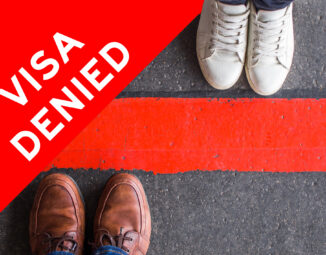Could Einstein Get a Green Card? Proposed DHS Changes Signal New Opportunities for American Colleges and Universities
The U.S. Department of Homeland Security (DHS) is proposing to expand the current list of evidentiary criteria for employment-based first preference (EB-1) outstanding professors and researchers to include a “comparable evidence provision.” The “comparable evidence provision” is significant, especially in more current or less established fields of endeavor, such as internet design or extreme sports, where more conventional kinds of evidence may not be available. For example, a twenty-something Swedish web designer who is well-known among the tech community could have considerable difficulty meeting the current out-of-date evidentiary requirements, such as finding a major trade journal in his field. The “comparable evidence provision” builds flexibility into the regulations so that such stars can benefit and contribute to the U.S. economy as immigrants. This proposal would harmonize the regulations for EB-1 outstanding professors and researchers with other employment-based immigrant categories that already allow for submission of comparable evidence.
The Immigration Act of 1990 (IMMACT90), among other things, reorganized immigrant classifications and created new employment-based immigrant classifications intended to cultivate a more competitive economy by encouraging increased immigration of skilled workers to meet our nation’s economic needs. These IMMACT90 provisions were enacted to address the need of American businesses for highly skilled, specially trained personnel to fill increasingly sophisticated jobs for which qualified U.S. workers could not be found. The need for high-skilled workers was based on an increasing skills gap in current and projected U.S. labor pools.
In order to attract the best and the brightest workers to the United States, our immigration system has established employment-based immigrant visa categories, meaning that qualified individuals may become permanent residents (green card holders) of the United States based upon their job skills, as opposed to requiring, for example, relatives to sponsor them. In the first preference category (EB-1) are “Aliens with Extraordinary Ability,” “Outstanding Professors and Researchers,” and Certain Multinational Executives and Managers.” EB-1 immigrants are so highly prized and sought after that Congress has waived the requirement that they first receive what is known as a “labor certification” from the Department of Labor. A labor certification is a process by which a prospective employer demonstrates that it has tried and failed to find a minimally qualified U.S. worker for a proposed position. The Department of Labor then certifies this to the U.S. Citizenship and Immigration Service and the employer is then free to hire the prospective foreign worker. The labor certification process, known as Programmed Electronic Records Management or PERM, is long and tedious, and can act as a deterrent for many employers to look overseas for much needed skilled workers. For EB-1 immigrants, the PERM process is waived, so the process by which they can get a green card and contribute their talent is much faster.
On May 12, 2014, a significant change was proposed by the Department of Homeland Security for EB-1 “Outstanding Professors and Researchers.” For these individuals the process for obtaining an immigrant visa has been further simplified. The current regulations state that a petitioner must submit evidence that the professor or researcher is recognized internationally as outstanding in the academic field specified in the petition. Such evidence shall consist of at least two of the following:
- Documentation of the alien’s receipt of major prizes or awards for outstanding achievement in the academic field;
- Documentation of the alien’s membership in associations in the academic field which require outstanding achievements of their members;
- Published material in professional publications written by others about the alien’s work in the academic field. Such material shall include the title, date, and author of the material, and any necessary translation;
- Evidence of the alien’s participation, either individually or on a panel, as the judge of the work of others in the same or an allied academic field;
- Evidence of the alien’s original scientific or scholarly research contributions to the academic field; or
- Evidence of the alien’s authorship of scholarly books or articles (in scholarly journals with international circulation) in the academic field.
8 CFR 204.5(i)(3).
These six categories contain no “comparable evidence provision” so that no matter how outstanding a scholar may be, if she does not have evidence of two or more of the above, then the path to a green card will stop at a red light. Such rigidity in the regulations governing the visa process for outstanding researchers or professors, if in place in the 1930s, may have precluded Albert Einstein from immigrating to the United States.
In the regulations implementing IMMACT90, the legacy INS recognized the importance of providing petitioners with some flexibility in the documentation that could be submitted to establish a beneficiary’s eligibility. The regulations therefore included a “comparable evidence provision” for EB-1 aliens of extraordinary ability and the employment-based second preference (EB-2) aliens of exceptional ability. This provision is a simple clause stating that “if the above standards do not readily apply to the beneficiary’s occupation, the petitioner may submit comparable evidence to establish the beneficiary’s eligibility.”
For example, to be classified as an alien of extraordinary ability the beneficiary must submit evidence of either a one-time major, international award (i.e., Nobel Prize) or submit evidence of three out of ten other kinds of evidence (i.e., receipt of lesser awards, published material about the alien in a major trade publication). With the “comparable evidence provision” an alien of extraordinary ability who may not have evidence that fits squarely within the ten enumerated types of evidence listed in the provisions may provide “comparable evidence” and still qualify for this classification.
However, under current regulations, the “comparable evidence provision” does not exist for outstanding researchers and professors. The initial evidentiary requirements are stated in the regulations and must be adhered to. Stakeholders in the educational and research arena have long expressed concern that current regulations—that do not allow petitioners to submit comparable evidence that the beneficiary is recognized internationally as an outstanding professor or researcher (as is allowed for aliens of extraordinary ability)—are out-of-date. In response to the request to harmonize the regulations and make them more consistent within the EB-1 category, DHS has agreed that amending 8 CFR 204.5(i)(3) to include a comparable evidence option is appropriate in order to attract eligible professors and researchers to emigrate to the United States. Under the new rule a petitioner may submit “comparable evidence” that demonstrates that the professor or researcher is internationally recognized as outstanding, if the categories of evidence listed in the current regulation do not readily apply. Examples might include important patents and prestigious peer reviewed funding or grants, which do not fit neatly into the enumerated list of initial evidence currently required.
It is anticipated that by introducing the “comparable evidence provision” into the outstanding researcher or professor category, U.S. colleges and universities will be able to attract more foreign scholars, especially in those areas where traditional or conventional methods of evaluation may be less in evidence. The example above of the Swedish web designer is apt: the field of internet technology is rapidly growing and scholars in this field may well prize and recognize one another’s contributions in ways not captured by current regulations. And yet, it is precisely in the field of internet technology that the U.S. stands to dramatically benefit economically. The proposed DHS rule changes are a welcome indictor that the U.S. continues to prize the contributions of foreign scholars, like Albert Einstein, who see the United States as a place that encourages intellectual inquiry.



